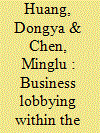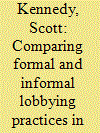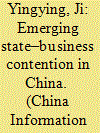| Srl | Item |
| 1 |
ID:
171086


|
|
|
|
|
| Summary/Abstract |
Most existing scholarship regards private businesspeople in China as allies of the party-state, without considering how the private sector’s policy influence is possible in an authoritarian state where the political elites dominate the policy-making process. Based on the large number of successful proposals that the All-China Federation of Industry and Commerce (ACFIC) has submitted to the Chinese People’s Political Consultative Conference, this study reveals the rising policy influence of private businesspeople in the past decade. It finds that their influence on government policy is not realized simply through collusion or informal ties with local governments at the stage of policy implementation. Instead, they now can voice their interests and exert influence as a group in national policy making at the central level through formal institutional channels. In recent years the influence of business associations affiliated with the ACFIC has been increasing, mainly due to institutional changes at the national level that encompass their input. This entails political co-optation that helps empower the private sector to exert influence on policy, rendering it unnecessary for the business community to challenge the political system from the bottom up.
|
|
|
|
|
|
|
|
|
|
|
|
|
|
|
|
| 2 |
ID:
090113


|
|
|
|
|
| Publication |
2009.
|
| Summary/Abstract |
The marketization of China's economy and the attendant need for a supporting regulatory framework have resulted in extensive lobbying by Chinese and foreign industry. The central party-state has adopted an ambivalent posture toward this development. On the one hand, the government has encouraged the development of industry associations, public hearings, and comment-and-response periods for draft laws and regulations to routinize public policy consultations. On the other hand, the central party-state is deeply concerned about the political consequences of permitting greater social activism, and hence, it continues to constrain the maturation of these same formal institutions and processes. As a consequence, informal lobbying practices, such as direct lobbying and manipulation of the media, have become more prominent vehicles for industry involvement in the policy process.
|
|
|
|
|
|
|
|
|
|
|
|
|
|
|
|
| 3 |
ID:
162352


|
|
|
|
|
| Summary/Abstract |
Based on an in-depth case study of a business association, this article explores how private entrepreneurs are organizing for their rights and highlights contentious facets of the state–business relationship in China. In contrast to depictions common in the literature, this business association actively asserts and seeks to maintain its autonomy vis-a-vis the state and uses innovative strategies to strengthen its own organizational cohesion. It organizes collective actions to defend members’ interests and to enhance the transparency and accountability of the local government. It even advances universal values, such as equal rights to justice. Importantly, however, the initiation and effects of collective actions are contingent on the opportunities embedded in China’s fragmented governance structure. I argue that corporatist analyses characterizing Chinese business associations as lacking autonomy and as partners of the state have overlooked such associations’ potential to engage in confrontations with the state. Combining involvement in the formal institution and contentious collective actions, the association studied displays the tension between the incorporation system and social resistance in contemporary China.
|
|
|
|
|
|
|
|
|
|
|
|
|
|
|
|